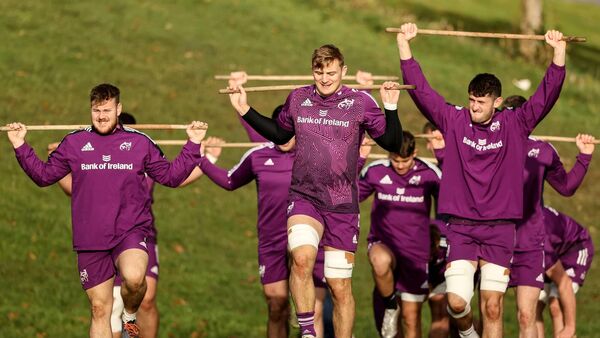Looking back on a calendar year that provided nine wins from a possible 11 and a first series win for Ireland against New Zealand, Andy Farrell and his fellow coaches will be happy campers as their side finishes 2022 on top of the World Rugby rankings.
He can look forward to seeing his men’s mettle tested at provincial and European level now. The next two months will be the final window for many of those on the fringes to play their way into the Irish squad ahead of next year’s World Cup.
Of all the provinces, it will be a particularly crucial block of games for Munster. With just 12 points from seven URC matches and an uncharacteristically poor points difference of -7 for this time of year, it’s plain that the opening part of the season didn’t go as well as it could have. The psychological blow of losing to all three provinces and having just one losing bonus point to show from those games has rubbed salt in the wound. The break for the international window came at the right time to allow everyone to regroup and get ready to go again.
Unfortunately, the fixture list isn’t very forgiving over the festive period and new year. Saturday’s clash with Connacht is the start of a run that includes three more interprovincial derbies and four games in Europe, against a Toulouse side nine points clear at the top of the Top 14 and a Northampton team in mixed form. They will also face an Edinburgh outfit firing well, an unpredictable Lions side and the banana skin of Benetton away in Italy.
The stakes are high, as are the possible rewards. Winning two of the interpros, both games against Northampton and turning over Toulouse in Thomond Park could transform the trajectory of Munster’s season and instill confidence in a playing and coaching group that is still finding its feet. An average or poor run of results could see them booted into the Challenge Cup at the round of 16 stage and battling to clamber up the URC table to secure qualification for the top tier of European rugby next season.
I am loath to describe Munster as a team in transition because I have heard it from at least one pundit every year since making my debut in 2013. This time, it’s an accurate assessment of where the club is at. After five years of Johann van Graan and six years of South African-dominated coaching tickets and playing styles, this season represents a significant departure.
Anyone who thinks you can change the coaching personnel, the culture they espouse and the way they want to attack, defend and generally run the show, without a bedding-in period and some trial and error, is deluded. Graham Rowntree, Mike Prendergast and Denis Leamy were all hugely popular appointments among the current playing group, ex-players and supporters alike, for good reason. They are extremely capable, personable and relatable guys that understand what Munster is about and connect with their players.
It is, however, important to remember that it takes time for coaches to settle in, gel with one another, bond with the playing group and ultimately, find a way of working that gets the best out of themselves and the men on the field. It takes time to put the foundations in place and reap the rewards.
WHEN Rob Penney took charge for his first season in 2012, Munster won three of their first seven games. That season, the team had plenty of tough days at the office, including bad losses to Ospreys, Scarlets (twice), Cardiff, and Dragons; a 24-point hammering at the hands of Benetton; and in a low point for the club, conceding 51 points in a defeat to Glasgow. They finished sixth that season, an enormous 27 points behind Ulster in first.
While critics and traditionalists were loudly lamenting this erratic league form, something meaningful was being built. To the surprise of many, Munster reached a European semi-final, losing by six points to Clermont. The following season we repeated that feat, going down by 10 points to champions Toulon, who defended their title at a canter against Saracens a month later.
It is crucial to take a long-term view of things in professional sport, even if the trend nowadays is to do the opposite. Even if that means going one step backward to take two or three steps forward. When the new coaching ticket was being put together, I got some flak for suggesting Munster supporters should be prepared to write off at least one year, if not two, to give the staff the space to experiment and mould the squad into the well-oiled machine we all want to see.
Ultimately, if Munster fail to reach a European quarter-final two years in a row but are then strong enough to reach a final or even win a European Cup, it would be a preferable outcome to continuing to reach the knock-out stages every year while remaining a level below Leinster, La Rochelle, Saracens, Toulouse and others. Short-term pain for long-term gain.
During the 2021 Six Nations, the knives were out for Andy Farrell. Ireland had been unconvincing since he took the helm and had stuttered to a series of unconvincing results. Paul O’Connell had been drafted in to help steady the ship. There was dismay at the lack of progress and the lack of creativity and ambition being shown in attack. Some analysts went so far as to suggest the only reason he couldn’t be sacked was that the IRFU couldn’t afford to pay him out of his contract.
Notably, the message from the players in camp was always positive. I was in touch with a number of guys in the set up at that time and they all said the atmosphere was fantastic and that they were enjoying themselves in a way they had not for some time. Granted, this wasn’t translating into what they were doing on the pitch but they were fully confident that after a bit of time, it would. There was never any question in their minds about whether Farrell was the right man for the job.
Fast forward 20 months. Farrell is now seen as infallible, such is the quality of the job he has done and the confidence he has cultivated in the group. Last Saturday’s game aside, we are enjoying the most entertaining rugby any Irish side has played on a consistent basis in the professional era. There is genuine optimism about what next year’s World Cup might deliver.
I moved back to Ireland three weeks ago and have spent plenty of time with current Munster players since then. They are saying the same thing the guys in Ireland camp were saying 20 months ago. The atmosphere is great, they are enjoying themselves and there is no doubt Rowntree, Prendergast and Leamy are the right men for the job.
There is a belief that they are building something sustainable. It might take some time but things are moving in the right direction. For supporters, that probably means we have some uncomfortable moments ahead before everything starts to click. And that’s okay; that is the reality of professional sport.
No team or coach should be immune from criticism and people are entitled to be honest about what needs to improve when things don’t go well. Similarly though, we have to be honest and accept that if this project is going to be given the best chance to succeed, it’s going to take a couple of years to get there.
It’s worth remembering the negativity directed at Andy Farrell not so long ago, and how quickly things can start to come good.

